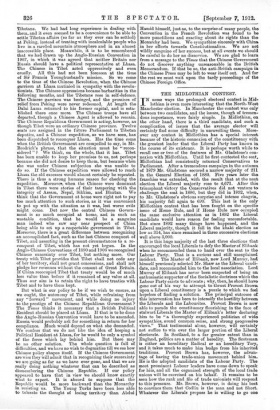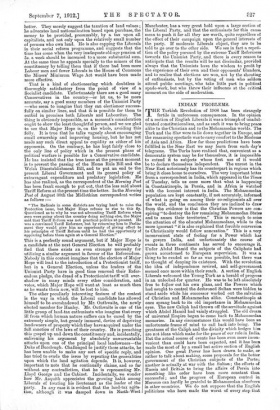'nib MIDLOTHIAN CONTEST.
TN some ways the prolonged electoral contest in Mid- lothian is even more interesting that the North-West Manchester election. In Manchester the contest was only between two candidates, and the issues, though of tremen- dous importance, were fairly simple. In Midlothian, on the other hand, there is a third candidate, and such a complication of issues that the average elector will certainly find some difficulty in unravelling them. More- over any contest in Midlothian has a special interest because of the historic connexion of the constituency with the greatest leader that the Liberal Party has known in the course of its existence. It is perhaps worth while to recall one or two of the features of Mr. Gladstone's con- nexion with Midlothian. -Until he first contested the seat, Midlothian had consistently returned Conservatives to Parliament. After a tremendous campaign in the autumn of 1879 Mr. Gladstone secured a narrow majority of 211 in. the General Election of 1880. Five years later the franchise was extended, with the result that at the next election the Liberal majority rose to 4,671. After this triumphant victory the Conservatives did not venture to challenge the seat in 1886, but they did in 1892, when, to Mr. Gladstone's obvious surprise and intense chagrin, his majority fell again to 690. This last is the only Midlothian contest that has been fought on the specific issue of Home Rule, and if Home Rule now occupied the same exclusive attention as in 1892 the Liberal candidate would have reason for feeling uncomfortable. But since 1892 many things have happened, and the Liberal majority, though it fell in the khaki election as low as 314, has since remained in three successive elections well above 3,000.
It is this huge majority of the last three elections that encouraged the local Liberals to defy the Master of Elibank when he recommended them to hand over the seat to the Labour Party. That is a eurious and still unexplained incident. The Master of Elibank, now Lord Murray, had himself previously selected Mr. Shaw as the Liberal candi- date, and recommended him to the local association. Lord. Murray of Elibank has never been suspected of being an enthusiastic supporter of the Socialistic doctrines which the Labour Party exists to advocate ; why, then, he should have gone out of his way to attempt to thrust Provost Brown upon a Liberal constituency is a puzzle to which we feel hopeless of finding a solution. The principal outcome of this intervention has been to intensify the hostility between the Liberals and the Labourites. Provost Brown is now able to parade the constituency flourishing in the face of stalwart Liberals the Master of Elibank's letter declaring him to be " a thoroughly experienced politician of wide sympathies, sound common sense, and strong progressive views." That testimonial alone, however, will certainly not suffice to win over the larger portion of the Liberal electorate. In Scotland, to a far greater extent than in England, politics are a matter of heredity. The Scotsman is either an hereditary Radical or an hereditary Tory, and it takes much to make him budge from his inherited traditions. Provost Brown has, however, the advan- tage of having the trade-union movement behind him. He is the adopted candidate of the Labour Party. The most prominent Labour leaders have come down to speak for him, and all the organized strength of the local trade unions will be exercised on his behalf. It remains to be seen how the rank and file of trade unionists will respond to this pressure. Mr. Brown, however, is doing his best to convince them that Codlin is the man and not Short. Whatever the Liberals propose he is willing to go one better. They merely suggest the taxation of land. values ; he advocates land nationalization based upon purchase, the money to be provided, presumably, by a tax upon all capitalists, and not only upon the relatively small number of persons who own land. He is also capping the Liberals in their social reform programme, and suggests that the time has come when the very inadequate old-age pension of 5s. a week should be increased to a more substantial sum. At the same time he appeals specially to the miners of the constituency by telling them that if there had been more Labour men and fewer Liberals in the House of Commons the Miners' Minimum Wage Act would have been made more effective.
That is a kind of electioneering which doubtless is thoroughly satisfactory from the point of view of a Socialist candidate. Unfortunately there are a good many Conservatives in the country—or let us, to be more accurate, say a good many members of the Unionist Party —who seem to imagine that they can electioneer success- fully on similar lines, and that it is possible for them to outbid in promises both Liberals and Labourites. The thing is obviously impossible, as a moment's consideration ought to show the least thoughtful person, and we are glad to see that Major Hope is, on the whole, avoiding this folly. It is true that he talks vaguely. about encouraging small ownership and improving housing, but he has not made any such direct appeal to cupidity as either of his opponents. On the contrary, he has kept fairly close to the only line of policy which in the present phase of political warfare is possible for a Conservative candidate. He has insisted that the true issue at the present moment is to prevent the passing of the Home Rule Bill and the Welsh Disestablishment Bill, and to put an end to the present Liberal Government and its general policy of extravagant expenditure and predatory legislation. He has also realized, as the correspondent of the Morning Post has been frank enough to put out, that the less said about Tariff Reform at the present time the better. In the Morning Post of August 30th the Midlothian correspondent writes as follows :-
" The Radicals in some districts are trying hard to raise the Protection issue, but Major Hope refuses to rise to this fly. Questioned as to why he was not advocating Tariff Reform when men were going about the country doing nothing else, the Major said that Tariff Reform was not practical politics at present. He was a convinced Tariff Reformer, but by returning him to Parlia- ment they would aive him no opportunity of giving effect to his principles of Tariff Reform until he had the opportunity of appearing before them again at a General Election."
This is a perfectly sound argument, but if Major Hope is a candidate at the next General Election he will probably find that there exists an even stroneer necessity for utilizing a similar argument in favour of theReferendum. Nobody in this contest imagines that the election of Major Hope will lead to the introduction of a Protectionist tariff, but in a General Election, unless the leaders of the Unionist Party have in good time renewed their Refer- endum pledge, the dread of a Protectionist tariff will over- shadow in many minds every other consideration, and votes, which Major Hope will want at least as much then as be wants them now, will be lost to him.
The other peculiarly interesting feature of the contest is the way in which the Liberal candidate has allowed himself to be overshadowed by Mr. Outhwaite. the newly elected member for Hanley. Mr. Outhwaite is one of the little group of land-tax enthusiasts who imagine that every ill from which human nature suffers can be cured by the extremely simple, but grossly immoral, device of depriving landowners of property which they have acquired under the full sanction of the laws of their country. He is preaching this gospel up and down the constituency and, incidentally, enlivening his argument by absolutely unwarrantable attacks upon one of the principal local landowners—the Duke of Buccleugh. Challenged to justify these attacks, he has been unable to make any sort of specific reply, and Las tried to evade the issue by repeating the generalities upon which the land agitation depends. It is, however, important to note that he continually claims, and so far without any contradiction, that he is representing Mr. Lloyd George and the Cabinet. Incidentally, we wonder how Mr. Asquith appreciates the growing habit among Liberals of treating his lieutenant as the leader of the party. In any case it is evident that the land-tax agita- tion, although it was damped down in North-West Manchester, has a very great hold upon a large section of the Liberal Party, and that the enthusiasts for this cause mean to push it for all they are worth, quite regardless of the effect of their campaign upon the general interests of the party. If moderate Liberals object, they are to be told to go over to the other side. We see in fact a repeti- tion of the policy pursued by the extreme Tariff Reformers towards the Unionist Party, and there is every reason to anticipate that the results will be not dissimilar, provided always that the Unionists have the wisdom to profit by the experience of their own and their opponents' blunders, and to realize that elections are won, not by the shouting of enthusiasts, but by the voting of men who seldom attend public meetings, who take little part in political spade-work, but who throw their influence at the critical moment on the side of moderation.







































 Previous page
Previous page